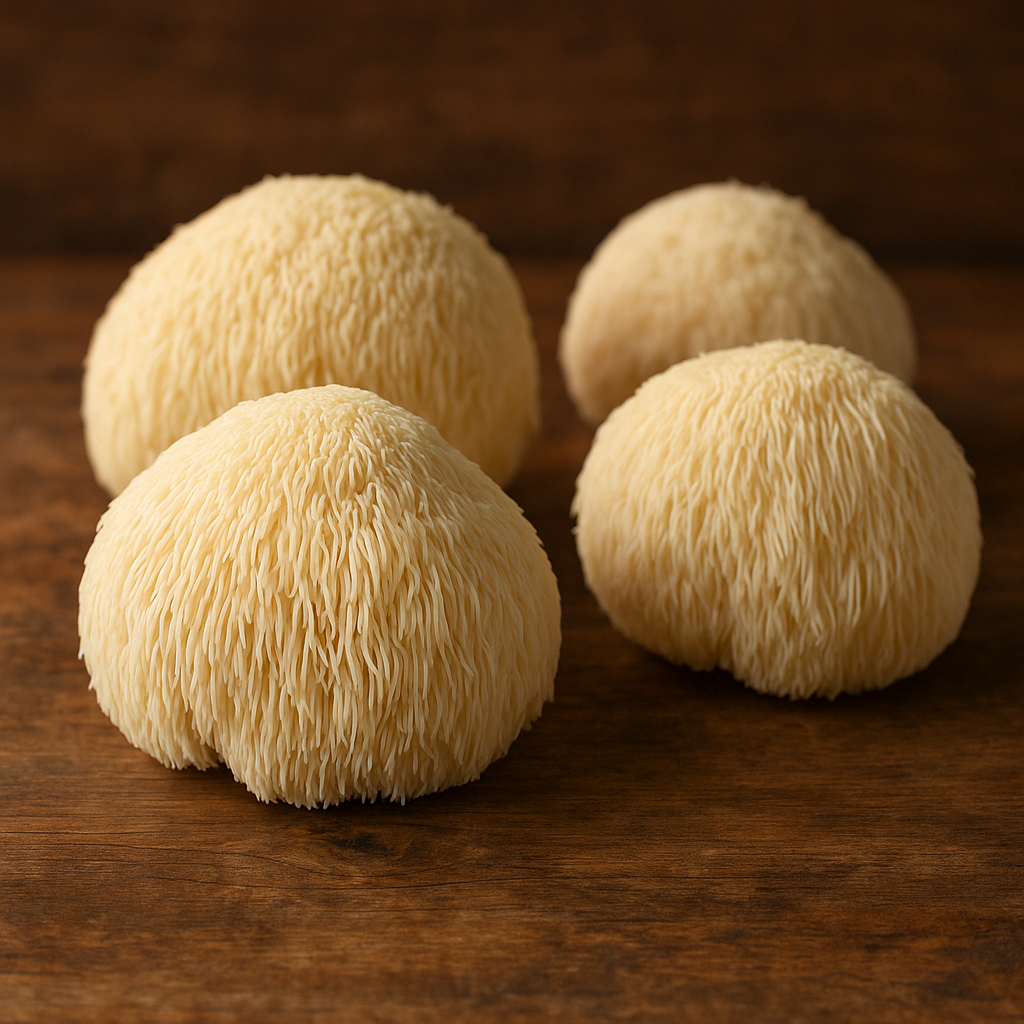
Lion’s Mane Mushrooms for Dogs: Nature’s Brain Booster?
Share
If you’re exploring functional foods for your dog’s brain, gut, and overall well-being, lion’s mane (Hericium erinaceus) is one of the most talked-about mushrooms.
In traditional cuisines it’s a tasty, edible mushroom; in modern research, compounds in lion’s mane are being studied for neuroprotective and anti-inflammatory effects. Below is what today’s evidence suggests—and what it doesn’t—so you can make informed choices for your pup.
Quick take
-
Promising areas: brain/nerve support, gut health, and inflammation modulation—based mostly on animal studies and small human trials.
-
For dogs specifically: there are no large, high-quality canine clinical trials yet; most findings are extrapolated from rodent and human research. (That means benefits are plausible but not proven for dogs.)
-
Safety: generally well-tolerated as a culinary mushroom; supplements look low-risk in short-term human studies, but talk to your vet—especially if your dog takes meds that affect bleeding, blood sugar, or immunity.
What is lion’s mane, and why the buzz?
Lion’s mane contains unique compounds—hericenones (mostly from the fruiting body) and erinacines (largely from the mycelium)—that can stimulate nerve growth factor (NGF) in cell and animal models. NGF supports the growth and survival of certain neurons, which is one reason lion’s mane is studied for brain health.
View the article
Potential benefits for dogs (based on current evidence)
1) Brain & nerve support
In animals and small human trials, lion’s mane has shown neurotrophic and neuroprotective effects—supporting neural growth pathways and sometimes improving aspects of cognition or stress in the short term. Findings are mixed and often small-scale, so they should be viewed as preliminary.
Read the study
Why it could matter for dogs: Healthy nerve signaling underpins learning, memory, and mobility. While we can’t claim canine benefits yet, the biological rationale (NGF stimulation) is relevant across mammals.
2) Gut health & inflammation
In mouse studies, lion’s mane extracts have shifted the gut microbiome toward beneficial species and reduced inflammatory markers in models of frailty and colitis. A growing body of lab and animal data suggests anti-inflammatory potential.
Read the study
Why it could matter for dogs: The gut–immune axis influences everything from digestion to skin health. Again, direct canine data are limited, but the mechanisms (beta-glucans, polysaccharides) are shared across species.
3) Antioxidant & general wellness support
Reviews highlight antioxidant activity and modulation of inflammatory pathways. These broad effects are not disease claims, but they help explain why lion’s mane features in many “whole-health” formulations.
Read the study
How to offer lion’s mane to your dog (practical tips)
Culinary use: As a food, lion’s mane is edible and generally safe—for people and dogs—when cooked. Raw mushrooms are hard to digest; cook them thoroughly and offer small tastes first to check tolerance.
View the article
Supplement forms: Powders, capsules, and extracts vary widely (fruiting body vs. mycelium; beta-glucan content; erinacine/hericenone profile). If you choose a supplement, look for clear labeling and third-party testing. (Supplement quality in general is variable.)
View the article
Start low, go slow: Because canine data are limited, start with a tiny amount to assess GI tolerance and discuss any steady use with your veterinarian.
Safety notes (read this before you start)
Overall tolerance: Human reports and toxicology studies show low rates of adverse effects with short-term use; mild GI upset or rashes can occur in sensitive individuals.
NCBI
Medication interactions: Lion’s mane may increase bleeding risk when combined with NSAIDs/anticoagulants and may affect blood sugar—important if your dog is on related medications. Always check with your vet.
Allergies/GI upset: Introduce gradually; stop if you see vomiting, diarrhea, itching, or hives. (Any new protein can trigger sensitivity.)
Don’t forage: Wild mushroom ID is risky; many wild species are toxic to dogs. Only use known, culinary lion’s mane from reputable sources.
Special populations: Extra caution for pregnant/lactating dogs, puppies, dogs with immune conditions, or those on immunosuppressive therapy. Discuss with your vet first.
Bottom line
Lion’s mane is an edible, generally safe culinary mushroom with encouraging—but not definitive—research for brain and gut support. For dogs, there’s insufficient clinical evidence to make firm claims, but the mechanisms are promising and the safety profile (as food) is favorable. If you’re curious to try it, cook it, start small, and loop in your veterinarian—especially if your dog takes daily meds.
What It Means for Your Dog’s Brain Health
At Smarter Dog, our mission is brain-first wellness for dogs—helping them stay curious, sharp, and energized from puppyhood through their senior years. Because what your dog eats helps shape their focus, behavior, and resilience, exploring functional ingredients like lion’s mane aligns directly with our goal of delivering clean, research-informed nutrition and content that supports canine cognition.
By investigating and sharing science-based insights, we aim to empower dog parents who care deeply about their pet’s mental as well as physical health to make smarter, data-driven choices for their dog’s well-being.
Stay connected with Smarter Dog
Want more science-based insights on canine brain health, nutrition, and longevity? Join our community by subscribing to the Smarter Dog newsletter. You’ll get research updates, expert guidance, and early access to new products—because a sharper mind starts with smarter care.
